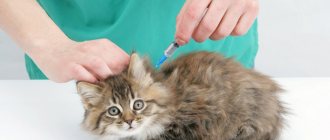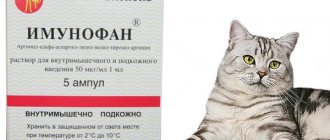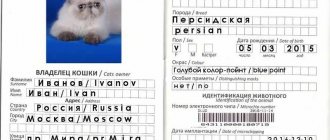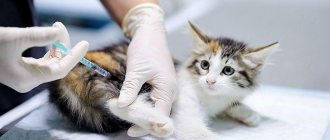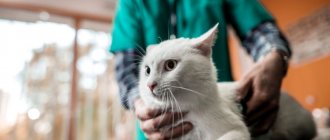Vaccination – one of the most important procedures for caring for domestic cats. This preventive measure helps prevent the development of the most dangerous feline diseases, leading to serious health consequences and premature death. Vaccinations for cats are done in veterinary clinics according to the vaccination calendar. The owner needs to properly prepare the animal for the procedure and follow all the doctor’s recommendations regarding caring for the cat after vaccination.
In the article we will look at why cats need vaccinations, how to prepare the animal for the procedure, recommendations for vaccinating cats depending on age, and types of medications.
What are the dangers of refusing vaccinations?
Vaccinations help cats develop immunity to dangerous infectious diseases. Infection is observed in only 10% of vaccinated people, but even in this case the disease proceeds without complications. In unvaccinated animals the situation is the opposite.
Refusal to vaccinate cats worsens the epidemiological situation in the regions, increasing the frequency of outbreaks of infectious diseases. For an unvaccinated pet, other animals taken for foster care or picked up on the street are dangerous.
Some persistent viruses are carried on outer clothing and shoes. Limiting communication with other animals and keeping them strictly at home does not guarantee complete safety. The only effective way of protection is annual vaccination against the most dangerous infections.
Key requirements for immunization
When immunizing a kitten, you should follow some rules:
- the drug can only be administered to a completely healthy pet;
- Injections are prohibited for a kitten after communicating with infected relatives;
- after immunization, surgical intervention is contraindicated for 21-25 days;
- after surgery, vaccination is not carried out for at least 21 days;
- if antibiotics are used for therapy, administration of the medication is allowed after 2 weeks;
- It is forbidden to vaccinate your pet when changing teeth;
- the vaccine should not be expired;
- It is contraindicated to vaccinate pets under 2 months of age;
- During the procedure, the baby must be calm.
What are cats vaccinated against?
The list of possible injections differs by region. Depending on the expediency of vaccinations for cats, there are 3 types:
1. Mandatory.
They do not depend on the place of residence and conditions of detention. This group includes the following diseases:
- Rabies
. Rabies vaccination for cats is mandatory not only in Russia, but also in other countries. This dangerous disease affects all parts of the central nervous system and poses a mortal danger to animals and people.
- Panleukopenia (distemper)
. It is difficult to treat in young and elderly animals due to rapid dehydration of the body. Accompanied by fever, damage to the gastrointestinal tract, heart and respiratory organs. Vaccinations against feline panleukopenia reduce the likelihood of infection by up to 10%.
- Calcivirosis
. Causes conjunctivitis and pneumonia, negatively affecting the immune system. As a result of the addition of a secondary infection, the probability of death increases to 80%.
- Rhinotracheitis
. The feline herpes virus affects the upper respiratory tract and causes death in 5-20% of cases.
2. Additional.
This group includes vaccination of cats against specific infections characteristic of certain regions:
- Leukemia
. Recommended for cats taken to the countryside and participating in exhibitions. Refers to cancer diseases that cause the development of lymphosarcoma.
- Chlamydia
. Infection with chlamydia is dangerous not only for the pet, but also for its owner.
- Bordetellosis
. Another disease that affects the upper respiratory tract. Dangerous for homeless animals that go outside freely and for animals kept in crowds.
- Leptospirosis
. Difficult to early diagnosis due to vague symptoms. The main carrier is small rodents.
3. Not recommended.
These vaccines for cats have not yet received convincing scientific evidence. Experimental grafting is typical for the following pathologies:
- Immunodeficiency virus
. Causes acute immunological failure. Characteristic of outbred and older animals.
- Infectious peritonitis (coronavirus infection)
. It is constantly present in the body of 80% of furry pets, but in only 10% it mutates and causes fluid to leak into the abdominal or chest cavity, followed by death.
- Dermatomycosis (ringworm)
. Fungal infection causing itching, hair loss and skin inflammation. Contagious to other pets and people.
Each injection is recorded in a veterinary passport - a cat document necessary for traveling abroad and within the country, participating in exhibitions and official matings. When moving to another country, it is recommended to find out in advance what vaccinations are given to kittens and adult pets for free entry. Less than 1 month should pass from the date of vaccination.
How is rabies transmitted?
The virus is contained in large quantities in the salivary glands of a sick animal. It has been established that the virus appears in the saliva of sick dogs 10 days before the first symptoms of the disease. When saliva gets into a bite wound or simply onto damaged skin, the rabies virus enters the body and travels along nerve fibers to the spinal cord and brain. The shorter this distance, the faster the signs of rabies develop in an infected animal or person. Therefore, bites to the head or neck are most dangerous.
Almost one hundred percent of cats with rabies die . People who are bitten are given preventive vaccination, the principle of which is based on the fact that the vaccine virus spreads throughout the body faster than the “wild” one and the immune system has time to develop protection. You should know that once the first symptoms of the disease appear, vaccination is useless.
What myths should you not believe?
The rare vaccination of kittens and adult pets in our country is due to a lack of knowledge. Some owners listen to errors of judgment against the advice of veterinarians. Popular myths associated with preventive injections include the following:
- Vaccinations are not necessary for indoor cats that do not go outside. Pathogenic microorganisms easily move inside the home on human clothing and shoes.
- The procedure is unreasonably expensive. Don't be afraid of the prices for cat vaccines. Prevention is always cheaper than cure
.
- Infection is dangerous only for purebred cats. The existing probability does not depend on breed
.
- Missing kitten vaccinations will negate the effectiveness of the procedure in adulthood. The injection schedule is always selected individually. Adult cats produce antibodies less well, but the risk of possible infection is still reduced
.
The recommended vaccination schedule is presented below. It is better to get more accurate information from your veterinarian.
In what cases is it necessary to get vaccinated?
We list the cases when vaccination against rabies is mandatory.
- Cat show. The veterinarian will not allow the animal to attend the event if there is no vaccination stamp in the passport.
- Breeding.
- The animal lives in a city or town that is officially declared free from rabies.
- Taking a cat abroad.
In all cases, a vaccination note is placed in the animal’s passport and must be confirmed by the signature and seal of a veterinarian. They also indicate the information about the vaccine administered or paste the bottle label into the passport. Since immunity in a cat does not develop immediately, the animal must be vaccinated at least a month before the date of the event (exhibition, export abroad), but no more than 11 months. Quarantine after vaccination against rabies in cats is not necessary.
Vaccination schedule
Immunity to infections is divided into passive and active. The first is acquired from the outside and has a temporary effect. The second is produced independently by successfully combating a viral agent. The safest way to obtain active immunity is preventive vaccination of cats.
Kitten's first vaccination
Passive immunity is transmitted to newborns from the mother through colostrum and lasts up to 4 months. When should kittens have their first vaccinations? Usually this is 2-2.5 months old. They are vaccinated against all diseases on the mandatory list, except rabies.
To consolidate the result, revaccination (re-vaccination) is carried out after 3-4 weeks. It helps increase the amount of antibodies needed to fight infections. Most often, the rabies vaccine for cats is administered together with others during revaccination, but not earlier than 3 months.
Kittens up to one year old
Up to a year, vaccination of kittens involves the use of all mandatory vaccines followed by revaccination. The recommended vaccination schedule for cats by age is presented in the table:
| Disease | Duration of first vaccination (month) | Revaccination period |
| Rabies | 3 | – |
| Panleukopenia (distemper) | 2-3 | 15-30 days |
| Calcivirosis | 2-3 | 15-30 days |
| Rhinotracheitis | 2-3 | 15-30 days |
The vaccination schedule for kittens is compiled by a veterinarian. Depending on the risk of infection in the place of residence, he may add other vaccines from the additional list.
Adults
If the first vaccination of a cat is carried out already in adulthood, then the scheme for constructing its schedule is similar. After the first and repeated injections, the procedures become annual.
Annual vaccination
After a year has passed from the date of re-vaccination of kittens, the procedure is carried out annually. The exception is rabies vaccination. The validity of this vaccine is longer, so lasting immunity lasts up to 3 years.
Vaccination of Scottish and British kittens
The Scots and the British are artificially bred breeds of cats, as a result of which they have almost no immunity of their own. Therefore, it is necessary to introduce all the required vaccines in childhood, since the possibility of infection is very high.
Although pets of such breeds are ornamental animals that rarely leave their homes, immunization must be taken seriously. These kittens do not need any special vaccinations. The drugs are suitable for any four-legged friend.
Types of vaccines for cats
Based on the method of exposure to the body, mono-vaccines and poly-vaccines are distinguished. The former protect only from one strain of viruses, the latter – from several at once. The duration of exposure is affected by the activity of viral agents. Dead fragments of the viral code provide short-term immunity, while weakened fragments provide long-lasting immunity.
Veterinarians recommend using complex vaccines with a weakened viral code. They reduce the number of injections and stimulate maximum antibody production.
The most popular drugs include:
- Dutch Nobivac
. Available in several versions that protect against 3 or 4 viruses. The drug is suitable for kittens.
- French "Quadricat"
. It is produced as a polyvaccine in 2 versions: rabies + panleukopenia and calcivirosis + rhinotracheitis. Both drugs are mixed and administered together.
- Russian "Multifel-4»
. Suitable for the prevention of chlamydia and all infections from the mandatory list, except rabies.
- American Fel-O-Vax
. It works similarly to Multifel.
All drugs must be certified and approved for sale in Russia. Violation of storage, transportation and packaging integrity precludes further use due to the high risk of complications.
How do vaccines work in kittens?
Kitten vaccines are usually first given at six to eight weeks of age and repeated approximately every three weeks until 16 to 18 weeks of age.
Some vaccines may be given together in one injection, called a combination vaccine (association vaccination). At your kitten's first veterinary exam, your veterinarian will discuss a vaccination schedule, as well as other treatments such as therapeutic deworming and a further parasite prevention regimen.
The vaccine injection itself is usually not painful. Your kitten may feel a little offended and depressed, but many pets do not react at all to the injection.
At your first visit, your veterinarian will examine your kitten before vaccination. Vaccines should never be given to a kitten with a fever or signs of overt illness, as the vaccine will not be effective. Giving a vaccine to a sick kitten may actually make the underlying disease worse.
Immunity does not develop immediately after the vaccine is administered. It takes five to 10 days for the immune system to take effect. However, kittens with remaining maternal antibodies will also be protected during this period. That is why you should not delay the first vaccination, but do it as early as possible from 2 months. It is impossible to be sure that the kitten still has maternal antibodies, so prophylactic exposures after injections are necessary. True immunity remains uncertain until the kitten is 16 to 18 weeks of age or has completed all preventive periods. Avoid exposing your kitten to unknown animals until all vaccinations are completed.
Rules for hosts
Preparatory measures will help to achieve the maximum effect from the procedure and minimize side effects. To avoid unpleasant consequences, be sure to take into account the existing contraindications.
If you are vaccinating a cat for the first time, get a preliminary detailed consultation with a veterinarian.
Preparation for the procedure
Before the procedure, you need to make sure that the pet is healthy and not infected with parasites. He is brought to the veterinary clinic for a preventive examination and undergoes basic tests. 1.5-2 weeks before vaccination, the kitten is given an anthelmintic (anthelmintic) and treated for external parasites. Contact with other cats is excluded. If any alarming symptoms appear, the planned schedule is shifted until complete recovery.
What will the veterinarian do at the clinic?
The kitten vaccine is administered directly at the veterinary clinic or at home. The second option is preferable for shy cats, but involves many risks. In a clinic setting, a veterinarian has more equipment and tools in case of force majeure. The risk of damage to the drug during transportation is also reduced.
After the first vaccination, the doctor issues a veterinary passport. All subsequent injections, treatments and examinations will be taken into account in this document. At the end of the procedure, it is recommended to stay and sit in the veterinary clinic to exclude an allergic reaction.
When not to vaccinate
For effective production of antibodies to the virus, the four-legged patient’s body must be completely healthy. Any weakening of immunity is a serious reason for changing the vaccination schedule. In addition to young age (less than 2 months), there are other contraindications for vaccination:
- estrus, pregnancy and lactation;
- 2 weeks after antibiotic therapy;
- 3 weeks before and after surgery;
- change of teeth;
- acute diseases.
To avoid infection, vaccinate your pets 1 month before mating. The resulting antibodies will help fight the infection and protect newborns. Remember that passive immunity received by kittens through colostrum only protects against those viruses against which the mother was vaccinated.
Primary vaccination and its distinctive features
From the age of 2 months, each kitten needs to be vaccinated regularly. At earlier stages, vaccinating an animal is pointless, since the body will not develop the required immunity. Primary immunization is necessary so that the pet’s body learns to resist many pathogens. This will help improve the health of the four-legged animal and also prolong its life.
Immunization is a strong stress for the baby's body. To avoid possible consequences, it is recommended to give the injection at home. In a familiar environment and next to the owner, the cat will tolerate this procedure more easily.
Before vaccinating a kitten for the first time, the possibility of contact with sick relatives should be excluded. If the baby interacts with an infected animal, immunization must be rescheduled.
This requirement also applies to pets who have undergone surgery. Primary vaccination for a four-legged friend is allowed only 25 days after surgery.
If a cat's baby teeth are replaced by permanent ones, the injection should be carried out after they are completely replaced.
Primary vaccination can provoke the development of adverse reactions in the form of lethargy, drowsiness, loss of appetite, loss of interest in games. This phenomenon is a normal reaction of the body to the administered drug.
If the baby refuses food for more than 24 hours, there is an increase in temperature and indifference, you urgently need to seek help from a veterinarian.
Possible side effects
Side effects are typical for any effect on the body. They are divided into light (non-hazardous) and heavy. The former disappear on their own, while the latter can only be eliminated with the help of medical intervention.
Why you can’t vaccinate an animal yourself
Veterinarians do not recommend vaccinating your pet yourself. Any mistake, often made with little experience, is fraught with serious side effects. Lack of comprehensive diagnosis may result in the adoption of an unhealthy cat. In such cases, a complicated course of the disease is observed with a high probability of death.
At home, there is no one to provide emergency assistance in case of an allergic reaction. You will also lose your veterinary passport, which must be filled out strictly at the clinic.
What post-vaccination symptoms indicate danger?
After vaccination, loss of activity and appetite, a slight rise in temperature, temporary lameness and the formation of a slight swelling at the injection site are allowed. The condition returns to normal within 1-4 days on its own.
If preparatory measures are followed, the likelihood of severe side effects
decreases to 0.5-1%. These include:
- progressive deterioration of the condition;
- persistence of swelling for more than a week with gradual growth and the appearance of suppuration;
- allergic reaction.
If any of these symptoms appear, be sure to contact your veterinarian. To avoid choking, which is typical of allergies, be sure to give your cat an antihistamine.
Possible consequences after vaccination
After immunization, some unpleasant consequences are possible:
- lethargy;
- lack of appetite;
- elevated temperature;
- pain at the injection site;
- encephalitis;
- polyneuritis;
- arthritis;
- convulsive conditions;
- changes in behavior;
- loss or change in hair color in the area where the medication was administered.
Increased sensitivity to the vaccine and immune reaction may manifest itself as:
- inability to develop immunity after injection;
- tumors at the injection site;
- reactions caused by incorrect or untimely vaccination.
What to do if your vaccination schedule has gone wrong
If you have adopted a street cat and are not sure about the dates of its vaccination, contact a veterinary clinic. A new pet will need a full diagnosis. Only then will the veterinarian be able to create a new schedule. Depending on the situation, a complete scheme may be proposed, typical for animals up to one year old, but more often the issue is resolved individually.
If the agreed date is missed once, it is recommended to vaccinate the animal as soon as possible. The shorter the interval, the greater the chance of maintaining immunity against viruses.
Timely compliance with the vaccination schedule is a reliable guarantee of your pet’s safety. Don't believe myths and be guided by sound logic, supported by statistics. The probability of infection of a vaccinated animal is only 10%, and even in this case it is reliably protected from a severe course of the disease with a fatal outcome.
The article is for informational purposes only. Contact your veterinarian!
How does the pet behave after manipulation?
Traveling to a veterinary hospital, unfamiliar aromas and people, and, in addition, unpleasant manipulation, are stressful for the animal, especially when it has not been taken out of its home before.
After returning from the hospital, the kitten may refuse food and play, hide in a secluded place and sleep for some time. After getting up, you need to offer your pet a small amount of his favorite treat.
The next time he refuses, you shouldn’t force him. Probably, the first day after vaccination the baby will only drink. You need to make sure that there is enough fresh water in the bowl.
During the first two days, you should not ventilate the room where the kitten is - due to a weakened immune system, it can easily catch a cold.
Learn about essential drugs in animals
- Use of Dirofen in cats
- Instructions for using Vetom in cats
- Instructions for using multifel in cats
- Instructions for use of fosprenil in cats
- Kotervin in cats
- Instructions for use Kot Bayun in cats
- Instructions for the use of feliferon in cats
- Stronghold in cats
- Instructions for use of Milbemax in cats
- Provides information about the drug gamavit
- Instructions for the use of spirovet in animals
- Instructions for use of tiamulin
- Instructions for use of Sevaxel in animals
- Instructions for use of thiam-oxy in animals
- Instructions for use of tetravet
- Application of TAF 25% in chickens
- Use of cefkinome in animals
- Instructions for the use of intramycin in animals
- Instructions for the use of inotil in animals. Calculate the optimal dose of the drug in dogs, cats, pigs, cows, sheep, goats
- Instructions for use of cobactan in dogs
- Instructions for the use of coliside in animals. Calculate the optimal dose of the drug in birds, pigs, cows, sheep, goats
- Instructions for the use of Marbox in animals. Calculate the optimal dose of the drug in dogs, cats, pigs, cows, sheep, goats
- Instructions for the use of inosel in animals. Calculate the optimal dose of the drug in dogs
- Instructions for the use of oxytetra in animals
^Top



